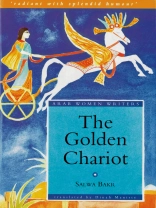From her cell in a women’s prison, Aziza decides to create a golden chariot to take her to heaven, where her wishes and dreams can be fulfilled. As she muses on who to take with her, she tells the life stories of her fellow prisoners and decides in her heart which ones deserve a free ride to paradise. Aziza’s cruelly frank comments about her friends and their various crimes including murder, theft, and drug-dealing weave these tales together into a contemporary Arabian Nights. Salwa Bakr takes a wry and cynical look at how women from widely differing backgrounds, some innocent and some guilty, come together in a single prison ward. Salwa Bakr’s writing depicts life at the grassroots of Egypt’s culture, admiring its resilience in the face of poverty and inequality. With a strong distrust of imported kitsch, western consumerism is contrasted with the indigenous culture. In The Golden Chariot, Salwa Bakr opens a magical door, through which we are able to see the injustices of a society in transition. Beyond these stories of crime, we glimpse the yearning and longing for a better life, and the problems of not being able to realize these dreams by honest means.
Mengenai Pengarang
SALWA BAKR was born in Cairo in 1949. She is the author of seven volumes of short stories, seven novels, and a play. Her work has been translated into nine languages.












